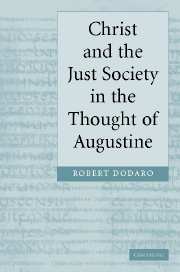Book contents
- Frontmatter
- Contents
- Acknowledgements
- List of abbreviations
- Introduction
- 1 Eloquence and virtue in Cicero's statesman
- 2 Justice and the limits of the soul
- 3 Christ and the formation of the just society
- 4 Divine eloquence and virtue in the scriptures
- 5 Wisdom's hidden reasons
- 6 Eloquence and virtue in Augustine's statesman
- General conclusion
- Select bibliography
- Index of references to Augustine's works
- Index of persons and subjects
6 - Eloquence and virtue in Augustine's statesman
Published online by Cambridge University Press: 22 September 2009
- Frontmatter
- Contents
- Acknowledgements
- List of abbreviations
- Introduction
- 1 Eloquence and virtue in Cicero's statesman
- 2 Justice and the limits of the soul
- 3 Christ and the formation of the just society
- 4 Divine eloquence and virtue in the scriptures
- 5 Wisdom's hidden reasons
- 6 Eloquence and virtue in Augustine's statesman
- General conclusion
- Select bibliography
- Index of references to Augustine's works
- Index of persons and subjects
Summary
In Chapter 1, we examined the development in Cicero's De re publica of his concept of the ideal statesman, whose just conduct and eloquence enabled him, in Cicero's view, to lead and sustain the just commonwealth. We noted as well that in his correspondence with public officials contemporaneous with his work on the City of God, Augustine referred to Roman statesmen and to Cicero's related discussion of the virtues of optimi uiri. Yet as we also observed in Chapter 2, Augustine did not endorse Cicero's concept of statesmanship, in particular the view that the statesman should be ‘nourished on glory’, nor did he accept Cicero's explanations of the model statesman's virtue, or the value of his example in oratory for fostering virtue within the commonwealth. Instead, as we observed, Augustine's true paradigm of the statesman (rector rei publicae) is found not in Cicero's optimus uir, but in Christ, who governs the city of God as the just society.
Yet, although Augustine is certain that Christian rulers will find in Christ the supreme model of civic virtue and eloquence, he also recognizes that neither Christ's virtue nor his eloquence can be fully imitated, because the source of his virtue, the unity between his divine and human natures, is unique to him. Moreover, Christ can never provide an example of contrition for sins or prayer for pardon.
- Type
- Chapter
- Information
- Christ and the Just Society in the Thought of Augustine , pp. 182 - 214Publisher: Cambridge University PressPrint publication year: 2004



